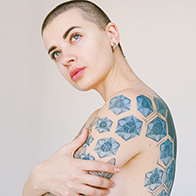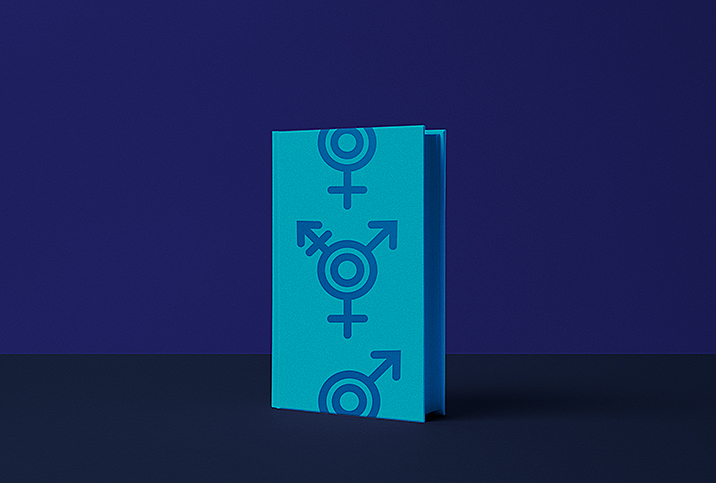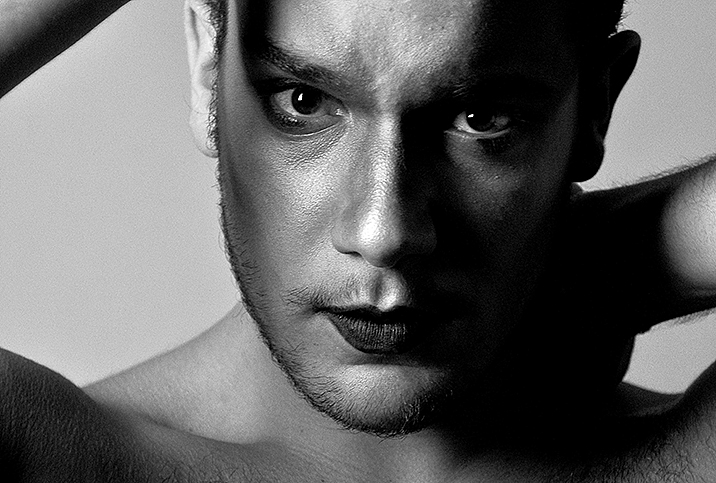What Does Sex Look Like for Intersex People?

When the Belgian model Hanne Gaby Odiele came out as intersex to Vogue in 2017, she broke barriers for the public’s understanding of intersex variations, of which there are about 30 manifesting in a person's chromosomes, genitals or reproductive anatomy. Odiele’s announcement followed years of breakthroughs by the global intersex movement.
Today, intersex people are often included in the extended version of the initials LGBTQIA, and our flag is now included in an updated version of the Pride flag designed by an intersex activist. Nevertheless, intersex people still face discrimination and misunderstanding, sometimes even within the LGBTQ community, and the experiences of intersex people—those whose reproductive or sexual anatomy doesn't tick off the male or female boxes—are still kept private in most cases.
But being intersex isn't nearly as rare as people may believe. Worldwide, approximately 1.7 percent of the population, or roughly more than 130 million people, is born intersex, according to Intersex Equality—about as common as having red hair.
Intersex variations can impact sex lives in a range of ways: Some people’s variations will manifest obviously to most sexual partners, whereas for others, even gynecological exams usually miss their mixed-sex traits. This variety appears because intersex variations have a complex set of causes—the way our bodies look really can’t be boiled down to XX or XY. Some intersex people have a large clitoris or a micropenis. Others have a urethra below the typical location on the penis, some have low testosterone while others have undescended testes. Mixed-sex traits can result from genetic anomalies or a wide range of hormone receptor sensitivities throughout the endocrine system.
Worldwide, approximately 1.7 percent of the population, or roughly more than 130 million people, is born intersex.
Coming to terms with your intersex variation often follows years of being expected to explain yourself without the obvious language to do so. Lor, an intersex person, said they didn’t discover their variation until their late 40s.
"As I didn't know I was intersex back then, I didn't disclose anything," Lor explained about their earliest sexual experiences. This led to friction during lesbian encounters. "Often women would look at my genitalia in bed and make surprised comments. Like, 'Wow, that's a big, long clitoris,'" Lor continued, "or, 'Jesus, that looks like a little dick.'"
Chloe, a 28-year-old who grew up in New England, was diagnosed at birth with Complete Androgen Insensitivity Syndrome, which affects the development of genitals and reproductive organs. She only discovered her diagnosis this year but had already grown used to encountering people who were taken aback by her.
"They're surprised I can be so masculine, and yet also be a heterosexual girl," Chloe said. "I'm like, 'It is what it is.' I was born to be a sexy extraterrestrial mutant."
Making intersex look 'normal'
Intersex people’s relationships with medical professionals are also often fraught. Genital surgeries and hormonal treatments are regularly arranged during early childhood and adolescence without clear and informed consent. Too often, these irreversible treatments aim to make bodies look "normal," sometimes with poor results and devastating side effects, including chronic pain, trauma, genital insensitivity and sterilization. Many doctors remain committed to a strictly pathologizing view of intersex variations, seeing us primarily as a series of puzzles and problems to be solved.
Sex education rarely touches on intersex topics, which can leave people with these variations feeling freakish. This contributes to a broader ignorance and is specifically damaging to younger intersex people trying to understand their bodies. Jonah, an intersex activist based in Berlin, said sex education resources presented to them growing up were "mostly confusing, as there was literally no mentions of bodies like mine."
Intersex people are often treated by sexual partners as intriguing curiosities.
Kay, an artist from London, said, "People would comment that they didn't know what gender I was, but still fancied me." This left Kay feeling "initially very nervous about sleeping with people."
On the other hand, she said that thanks to her experiences, "I often see myself as being able to do more than one flavor of sex, and I get a lot out of my sex life as a result."
Because intersex people often feel obligated to educate sexual partners on their variations and what that looks like, this raises the stakes and complicates potential flings—very quickly, carefree flirting can swerve into intrusive questions and relived traumas. This leads many of us to avoid casual sex.
Mariah, an agender lesbian, stressed that disclosure is a question of give and take.
"I don't think it's reasonable to expect me to have in-depth conversations about my medical history, surgical scars and fertility on a first date," they said. But waiting too long could result in hurt feelings, and potential partners feeling misled. "I wish there was better social understanding about these issues," they added. "That would make these kinds of conversations more straightforward."
Just like other members of the LGBTQ community, intersex people are at high risk of experiencing prejudice, violence and hate speech, according to a 2015 report published in the Inter-American Commission of Human Rights.
Leslie, an intersex person who grew up in the Bible Belt in the 1980s and 90s, was overwhelmed by the religious communities surrounding her. Coming to terms with her bisexuality following the death of Matthew Shephard—a gay student at the University of Wyoming who was murdered in 1998—Leslie mostly dated men and was paranoid about her dates and family discovering her sexuality.
However, partners seemed mostly oblivious to Leslie’s intersex variation, which gynecological exams often missed. She discovered her XXY chromosomes only when considering marriage (then aged 23), under pressure from her fiancé to find an explanation for irregular periods. When the doctor offered a diagnosis, her heterosexual male partner responded with rage; destroying the official report on her genetics and becoming physically abusive toward her and her grandmother. For around five years Leslie continued to occasionally have sex with cis men to feel "like a real woman"—in-between unsatisfying relationships with cis lesbians and closeted trans men—before finally starting to disclose her intersex variation to romantic partners in her 30s. She still doesn’t disclose it to medical providers.
Challenged by intersex bodies
Many people who aren't intersex find themselves challenged by intersex bodies, and may even see them as threatening to their sexual orientation or basic understanding of human biology. In other words, intersex people upset others not only because they don’t understand who we are, but because we oblige them to reconsider who they are.
In this context, intersex people can be left with bleak and frustrated attitudes toward their sex lives and romances.
One intersex person who asked to remain anonymous said they feel both welcomed and frustrated within LGBTQ circles.
"Folks can barely define what intersex is, let alone have robust conversations about intersex sex," they said.
Intersex people have often relied on a variety of other minority communities—from leather scenes to goth nightlife—to facilitate partnership and pleasure. These subcultures can encourage understanding and celebrate sexual ambivalence.
"Don't buy into the idea that you're a failure unless you're having straight and penetrative sex," said another intersex activist who asked to remain anonymous. "There's a lot of ways to experience pleasure, and people out there who will help you find them."
Intersex dating
As intersex communities strengthen and expand worldwide, dating and partnering with other intersex people is also an increasingly popular option (described by Jonah as "Inter4Inter" relationships). These connections can allow a lot of what usually has to be explained to instead be intuitively shared.
While intersex people face struggles that are still not widely understood, many sounded a hopeful note.
"The older I get, the less being intersex is an issue for me," said Duffy, a 78-year-old intersex person. "Life is a banquet, grab a plate and enjoy!"




















